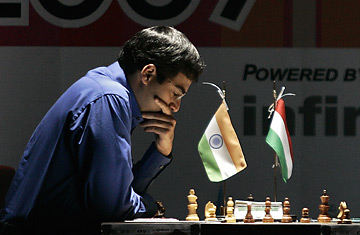
Indian chess master Viswanathan Anand plays in the final round of the World Chess Championship, September 29, 2007, in Mexico City.
As anyone who has ever driven in this country knows, Indians are a competitive bunch. So why, then, with a billion-plus people, does the country lag so far behind on the sports field? Sure, India remains a major cricket power, and you wouldn't count it out of any men's field hockey tournament. But Indians have won just three medals at the last three summer Olympics, two bronze and one silver. Compare that to the medal haul over the same period of their neighbor and fierce rival, China: 172 medals, including 76 gold. "It's one of the things that nags Indians — why we're so bad at sports," says Viswanathan Anand, the number one-ranked chess player in the world and the winner last month of the World Chess Championship in Mexico City. "Kind of a mystery."
And that may be one reason why Anand, the clean-cut grandmaster, is treated as India's greatest current sportsman. His arrival at Delhi airport earlier this week prompted the sort of mob scene normally associated with India's most beloved cricketers. Hundreds of chess fans turned out at 1 in the morning to wave placards and shout his name, surging forward to touch their hero when he finally appeared. "There is the odd country where there's some lingering doubt whether chess is art or sport," he says. "Quite clearly it is a sport."
Anand's mother taught him the game when he was just six. A couple of years later his family moved to the Philippines for a year, right after the country had been the venue for a hard-fought but bizarre World Championship showdown between Soviet aces Anatoli Karpov and Viktor Korchnoi, the latter now living abroad under political asylum — the highly publicized match included allegations of hypnotism, X-rayed chairs and mirrored sunglasses. "There was so much talk of chess and I just got sucked into the whole scene," he says now.
Back home in India, he became part of the "small but passionate" chess scene in the southern city of Chennai (formerly Madras) and won his first big tournament, the national sub-junior champs, at the age of 14. "It was a world which is even difficult to imagine these days," he says. Magazines took months to arrive by mail, and Chennai felt like a distant outpost. "Nowadays geography doesn't matter as much," says Anand. "If I want to play someone on the other side of the world I can just start a game online. Back then we used to photocopy games and send them around."
At 16, Anand won the national championship, and by 18 he had become India's first grandmaster, an elite designation made by the international chess federation on the basis of a complex rating system. He developed a reputation as a fast player but also a good all-rounder: equally adept at classical matches, rapid matches, knockouts and against computers. He broke into the world's top ranks in the early 1990s, and has remained there ever since, winning a world championship in 2000 — when the title was split between two different federations (much as in boxing)— and again this year, when it was finally reunified. Next year he will take on Vladimir Kramnik, a former World Champion who came in second in Mexico and was guaranteed the right to re-challenge the winner in 2008.
Chess has become a younger man's game over the past couple of decades. The average age in tournaments used to be in the mid-30s but now "with computers and the nature of the game itself, the average age is probably down in the early 20s," says Anand, who at 37 predicts he'll play competitively only for another eight years or so. "I've always managed to stay motivated and I work hard at it," says the champion, who divides his time between India and a small village outside Madrid. Just as with other top Indian sportsmen, Anand's endorsement is sought after by marketers, who use his image to advertise cookies and a malted hot drink. He is also a "brand ambassador" for NIIT, a corporate training company that has taken chess into more than 5,000 schools across India. "I'm very optimistic about the next generation of Indian players," he says. "You're already seeing that in women's chess, where some of the highest-rated women in the world are Indian."
Anand is also hoping that chess will be an exhibition sport at the London Olympics, and a real event in 2016. If that happens, he might just stick around to try to win India a gold.
